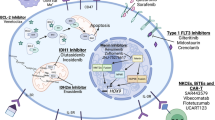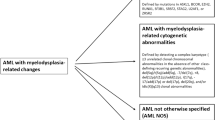Abstract
This open-label, single-arm, phase 2 study (ClinicalTrials.gov, NCT03128411) evaluated the efficacy, safety, and pharmacokinetics of bosutinib at a starting dose of 400 mg once daily (QD) in Japanese patients with newly diagnosed chronic phase chronic myeloid leukemia (CP CML). The primary endpoint was major molecular response (MMR) at Month 12 in the modified as-treated population (Philadelphia chromosome-positive [Ph+] patients with e13a2/e14a2 transcripts). Sixty Japanese patients with CP CML were treated with bosutinib; median age was 55 years (range 20–83), 60.0% were males, and all were Ph+ and had e13a2/e14a2 transcripts. After median follow-up of 16.6 months (range 11.1–21.9), 41 (68.3%) patients remained on bosutinib. The MMR rate at Month 12 was 55.0% (2-sided 90% confidence interval: 44.4–65.6). There were no on-treatment transformations to accelerated/blast phase, and no patient died on treatment or within 28 days of the last bosutinib dose. The most common treatment-emergent adverse events were diarrhea (86.7%), increased alanine aminotransferase (55.0%), and increased aspartate aminotransferase (46.7%). The primary objective of this phase 2 study was met, and there were no new safety signals for bosutinib. These data suggest bosutinib is an effective first-line treatment option for Japanese patients with newly diagnosed CP CML.

Similar content being viewed by others
Data availability
Upon request, and subject to certain criteria, conditions and exceptions (see https://www.pfizer.com/science/clinical-trials/trial-data-and-results for more information), Pfizer will provide access to individual de-identified participant data from Pfizer-sponsored global interventional clinical studies conducted for medicines, vaccines and medical devices (1) for indications that have been approved in the US and/or EU or (2) in programs that have been terminated (i.e., development for all indications has been discontinued). Pfizer will also consider requests for the protocol, data dictionary, and statistical analysis plan. Data may be requested from Pfizer trials 24 months after study completion. The de-identified participant data will be made available to researchers whose proposals meet the research criteria and other conditions, and for which an exception does not apply, via a secure portal. To gain access, data requestors must enter into a data access agreement with Pfizer.
References
Pfizer Inc. Bosulif® (bosutinib) prescribing information. 2012 (last update: Dec 2017). https://www.accessdata.fda.gov/drugsatfda_docs/label/2017/203341s009lbl.pdf. Accessed 11 Nov 2019.
European Medicines Agency. Bosulif® (bosutinib) summary of product characteristics. 2013 (last update: Aug 7, 2019). https://www.ema.europa.eu/en/medicines/human/EPAR/bosulif. Accessed 11 Nov 2019.
Pfizer Japan Inc. Bosulif® (bosutinib hydrate) prescribing information. Japan; 2017.
Cortes JE, Gambacorti-Passerini C, Deininger MW, Mauro MJ, Chuah C, Kim DW, et al. Bosutinib versus imatinib for newly diagnosed chronic myeloid leukemia: results from the randomized BFORE trial. J Clin Oncol. 2018;36:231–7.
Cortes JE, Kantarjian HM, Brummendorf TH, Kim DW, Turkina AG, Shen ZX, et al. Safety and efficacy of bosutinib (SKI-606) in chronic phase Philadelphia chromosome-positive chronic myeloid leukemia patients with resistance or intolerance to imatinib. Blood. 2011;118:4567–76.
Khoury HJ, Cortes JE, Kantarjian HM, Gambacorti-Passerini C, Baccarani M, Kim DW, et al. Bosutinib is active in chronic phase chronic myeloid leukemia after imatinib and dasatinib and/or nilotinib therapy failure. Blood. 2012;119:3403–12.
Cortes JE, Kim DW, Kantarjian HM, Brummendorf TH, Dyagil I, Griskevicius L, et al. Bosutinib versus imatinib in newly diagnosed chronic-phase chronic myeloid leukemia: results from the BELA trial. J Clin Oncol. 2012;30:3486–92.
Hughes T, Deininger M, Hochhaus A, Branford S, Radich J, Kaeda J, et al. Monitoring CML patients responding to treatment with tyrosine kinase inhibitors: review and recommendations for harmonizing current methodology for detecting BCR-ABL transcripts and kinase domain mutations and for expressing results. Blood. 2006;108:28–37.
National Cancer Institute. Common Terminology Criteria for Adverse Events (CTCAE) v4.03. 2010 (last update: Jun 14, 2010). https://evs.nci.nih.gov/ftp1/CTCAE/CTCAE_4.03/CTCAE_4.03_2010-06-14_QuickReference_8.5x11.pdf. Accessed 11 Nov 2019.
Saglio G, Kim DW, Issaragrisil S, le Coutre P, Etienne G, Lobo C, et al. Nilotinib versus imatinib for newly diagnosed chronic myeloid leukemia. N Engl J Med. 2010;362:2251–9.
Au WY, Caguioa PB, Chuah C, Hsu SC, Jootar S, Kim DW, et al. Chronic myeloid leukemia in Asia. Int J Hematol. 2009;89:14–23.
Kim DW, Banavali SD, Bunworasate U, Goh YT, Ganly P, Huang H, et al. Chronic myeloid leukemia in the Asia-Pacific region: current practice, challenges and opportunities in the targeted therapy era. Leuk Res. 2010;34:1459–71.
Jootar S. CML treatment in Asia-Pacific region. Hematology. 2012;17(Suppl 1):S72–S7474.
Nakaseko C, Takahashi N, Ishizawa K, Kobayashi Y, Ohashi K, Nakagawa Y, et al. A phase 1/2 study of bosutinib in Japanese adults with Philadelphia chromosome-positive chronic myeloid leukemia. Int J Hematol. 2015;101:154–64.
Deininger MW, Kota V, Lipton JH, Milojkovic D, García Gutiérrez V, Leip E, et al. Bosutinib or imatinib in older vs younger patients with newly diagnosed chronic myeloid leukemia in the phase 3 BFORE trial. Blood. 2018;132:1734.
Brummendorf TH, Cortes JE, de Souza CA, Guilhot F, Duvillie L, Pavlov D, et al. Bosutinib versus imatinib in newly diagnosed chronic-phase chronic myeloid leukaemia: results from the 24-month follow-up of the BELA trial. Br J Haematol. 2015;168:69–81.
Hsyu PH, Mould DR, Upton RN, Amantea M. Pharmacokinetic-pharmacodynamic relationship of bosutinib in patients with chronic phase chronic myeloid leukemia. Cancer Chemother Pharmacol. 2013;71:209–18.
Mita A, Abumiya M, Miura M, Niioka T, Takahashi S, Yoshioka T, et al. Correlation of plasma concentration and adverse effects of bosutinib: standard dose or dose-escalation regimens of bosutinib treatment for patients with chronic myeloid leukemia. Exp Hematol Oncol. 2018;7:9.
Kantarjian H, Shah NP, Hochhaus A, Cortes J, Shah S, Ayala M, et al. Dasatinib versus imatinib in newly diagnosed chronic-phase chronic myeloid leukemia. N Engl J Med. 2010;362:2260–70.
Khoury HJ, Gambacorti-Passerini C, Brummendorf TH. Practical management of toxicities associated with bosutinib in patients with Philadelphia chromosome-positive chronic myeloid leukemia. Ann Oncol. 2018;29:578–87.
Cortes JE, Apperley JF, DeAngelo DJ, Deininger MW, Kota VK, Rousselot P, et al. Management of adverse events associated with bosutinib treatment of chronic-phase chronic myeloid leukemia: expert panel review. J Hematol Oncol. 2018;11:143.
Kantarjian HM, Cortes JE, Kim DW, Khoury HJ, Brummendorf TH, Porkka K, et al. Bosutinib safety and management of toxicity in leukemia patients with resistance or intolerance to imatinib and other tyrosine kinase inhibitors. Blood. 2014;123:1309–18.
Barber MC, Mauro MJ, Moslehi J. Cardiovascular care of patients with chronic myeloid leukemia (CML) on tyrosine kinase inhibitor (TKI) therapy. Hematol Am Soc Hematol Educ Program. 2017;2017:110–4.
Medeiros BC, Possick J, Fradley M. Cardiovascular, pulmonary, and metabolic toxicities complicating tyrosine kinase inhibitor therapy in chronic myeloid leukemia: strategies for monitoring, detecting, and managing. Blood Rev. 2018;32:289–99.
Fujioka I, Takaku T, Iriyama N, Tokuhira M, Kimura Y, Sato E, et al. Features of vascular adverse events in Japanese patients with chronic myeloid leukemia treated with tyrosine kinase inhibitors: a retrospective study of the CML Cooperative Study Group database. Ann Hematol. 2018;97:2081–8.
Fujisawa S, Nakamae H, Ogura M, Ishizawa K, Taniwaki M, Utsunomiya A, et al. Efficacy and safety of dasatinib versus imatinib in Japanese patients with newly diagnosed chronic-phase chronic myeloid leukemia (CML-CP): Subset analysis of the DASISION trial with 2-year follow-up. Int J Hematol. 2014;99:141–53.
Nakamae H, Fujisawa S, Ogura M, Uchida T, Onishi Y, Taniwaki M, et al. Dasatinib versus imatinib in Japanese patients with newly diagnosed chronic phase chronic myeloid leukemia: a subanalysis of the DASISION 5-year final report. Int J Hematol. 2017;105:792–804.
Nakamae H, Shibayama H, Kurokawa M, Fukuda T, Nakaseko C, Kanda Y, et al. Nilotinib as frontline therapy for patients with newly diagnosed Ph+ chronic myeloid leukemia in chronic phase: results from the Japanese subgroup of ENESTnd. Int J Hematol. 2011;93:624–32.
Nakamae H, Fukuda T, Nakaseko C, Kanda Y, Ohmine K, Ono T, et al. Nilotinib vs. imatinib in Japanese patients with newly diagnosed chronic myeloid leukemia in chronic phase: long-term follow-up of the Japanese subgroup of the randomized ENESTnd trial. Int J Hematol. 2018;107:327–36.
Kizaki M, Takahashi N, Iriyama N, Okamoto S, Ono T, Usui N, et al. Efficacy and safety of tyrosine kinase inhibitors for newly diagnosed chronic-phase chronic myeloid leukemia over a 5-year period: results from the Japanese registry obtained by the New TARGET system. Int J Hematol. 2019;109:426–39.
Goldberg SL, Savona M, Mauro MJ. Considerations for successful treatment-free remission in chronic myeloid leukemia. Clin Lymphoma Myeloma Leuk. 2018;18:98–105.
Rea D, Nicolini FE, Tulliez M, Guilhot F, Guilhot J, Guerci-Bresler A, et al. Discontinuation of dasatinib or nilotinib in chronic myeloid leukemia: interim analysis of the STOP 2G-TKI study. Blood. 2017;129:846–54.
Ross DM, Masszi T, Gomez Casares MT, Hellmann A, Stentoft J, Conneally E, et al. Durable treatment-free remission in patients with chronic myeloid leukemia in chronic phase following frontline nilotinib: 96-week update of the ENESTfreedom study. J Cancer Res Clin Oncol. 2018;144:945–54.
Mahon FX, Hughes TP. Treatment-free remission after second-line nilotinib treatment. Ann Intern Med. 2018;169:510.
Okada M, Imagawa J, Tanaka H, Nakamae H, Hino M, Murai K, et al. Final 3-year results of the dasatinib discontinuation trial in patients with chronic myeloid leukemia who received dasatinib as a second-line treatment. Clin Lymphoma Myeloma Leuk. 2018;18(353–60):e1.
Saussele S, Richter J, Guilhot J, Gruber FX, Hjorth-Hansen H, Almeida A, et al. Discontinuation of tyrosine kinase inhibitor therapy in chronic myeloid leukaemia (EURO-SKI): a prespecified interim analysis of a prospective, multicentre, non-randomised, trial. Lancet Oncol. 2018;19:747–57.
Acknowledgements
This study was sponsored by Pfizer. Medical writing support was provided by Joanna Bloom, PhD, of Engage Scientific Solutions and was funded by Pfizer.
Author information
Authors and Affiliations
Corresponding author
Ethics declarations
Conflict of interest
Masayuki Hino reports research funding from Pfizer, Novartis, and Otsuka, and honoraria from Pfizer, Novartis, Otsuka, and Bristol-Myers Squibb. Itaru Matsumura reports research funding from Pfizer and Otsuka, speakers bureau with Novartis and Bristol-Myers Squibb, and consultancy with Otsuka. Shin Fujisawa reports honoraria and research funding from Novartis, Pfizer, Otsuka, and Bristol-Myers Squibb. Kenichi Ishizawa reports research funding from Pfizer and Otsuka and speakers bureau with Novartis and Bristol-Myers Squibb. Takaaki Ono reports honoraria from Celgene, Merck Sharp & Dohme, Ono, Novartis, Bristol-Myers Squibb, Pfizer, Otsuka, and Takeda and research funding from, Celgene, Merck Sharp & Dohme, Ono, Kyowa Hakko Kirin, and Chugai. Emiko Sakaida reports research funding from Bristol-Myers Squibb, Chugai, Ono, and Kyowa Kirin. Naohiro Sekiguchi reports research funding from Ono, A2 Healthcare, Astellas, Janssen, Merck Sharp & Dohme, Otsuka, Pfizer, PPD-SNBL, Sumitomo Dainippon Pharma, Daiichi Sankyo Company, and Bristol-Myers Squibb. Yusuke Tanetsugu, Kei Fukuhara, Masayuki Ohkura, and Yuichiro Koide report employment by Pfizer R&D Japan G.K. Naoto Takahashi reports research funding and honoraria from Pfizer, Otsuka, and Novartis, and research funding from Chugai, Eizai, Asahikasei, Ono, Kyowahakko-Kirin, and Toyamakagaku, outside the submitted work.
Additional information
Publisher's Note
Springer Nature remains neutral with regard to jurisdictional claims in published maps and institutional affiliations.
Electronic supplementary material
Below is the link to the electronic supplementary material.
About this article
Cite this article
Hino, M., Matsumura, I., Fujisawa, S. et al. Phase 2 study of bosutinib in Japanese patients with newly diagnosed chronic phase chronic myeloid leukemia. Int J Hematol 112, 24–32 (2020). https://doi.org/10.1007/s12185-020-02878-x
Received:
Revised:
Accepted:
Published:
Issue Date:
DOI: https://doi.org/10.1007/s12185-020-02878-x




